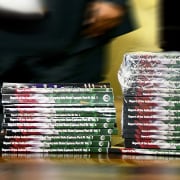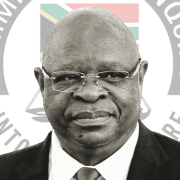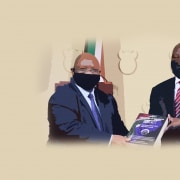|
Getting your Trinity Audio player ready...
|
Welcome to our first update of the year on all things state capture and the state capture commission and the implementations of its recommendations. The presidency released a progress report in late November last year that documents its implementation of the recommendations by commission chairperson, Chief Justice Raymond Zondo.
The year has started off with a scolding of one of the people implicated in the capture of Prasa. Judge Nana Makhubele, the former chairperson of Prasa, is the subject of a judicial conduct tribunal investigation into her fitness for the bench. She was implicated in interfering in the affairs of the agency’s procurement and legal processes while in office between 2017 and 2018, having been appointed by then transport minister, Joe Maswanganyi.
Makhubele was appointed as a judge of the High Court despite holding the chairperson role, which she is accused of not having divulged at the time.
On Monday 22 January, tribunal chairperson Judge President Achmat Jappie refused to grant a postponement application by Makhubele’s legal representative, declaring that the hearings would assume two days later, on 24 January. The tribunal has heard of several disputes relating to Makhubele’s ability to appear before it, including complications surrounding the payment of her legal fees, which amount to around R3-million to date.
The tribunal was set up in 2021 following a complaint by #UniteBehind, which argued that Makhubele had breached the code of conduct for judges, having stayed on as Prasa chair after her appointment to the North Gauteng High Court. The organisation further cited a conflict of interest in legal matters brought against Prasa in the years before and during her tenure as its chairperson. Among these is the case involving Siyaya, a service provider of Prasa that has been linked to corruption and is the subject of an ongoing legal battle with the agency.
In other state capture-related news involving a member of the judiciary, suspended Pretoria chief magistrate Desmond Nair saw his case return to court in the same week. He was implicated in Bosasa corruption and accused of receiving kickbacks in the form of home security improvements from the company. Nair has previously made representations to National Prosecuting Authority (NPA) head Shamila Batohi to have the charges against him dropped, but has failed in his attempt. His case has been postponed to 15 March 2024.
SAP payback
The NPA announced last week that German software giant SAP will pay R2.2-billion in restitution to the South African government, for its part in corruption involving bribes in relating to its business with Eskom. The bribery allegations surfaced at the time of the #GuptaLeaks, the files of evidence admitted before the state capture commission during its term. According to the NPA, the money will go to several state-owned entities, including Eskom, Transnet, Sars, Prasa and the cities of Johannesburg and Tshwane. News24 reports that prosecutors said several of the tainted contracts that SAP entered into were secured by companies linked to the Gupta family, including CAD House, Global Softech Solutions, and Lejara Global Solutions.
The Department of Justice said the investigation into SAP revealed that between 2013 and 2017, the company paid bribes to South African officials to falsify its books, records, and accounts. The goal was to win contracts at the City of Johannesburg, the City of Tshwane, the Department of Water and Sanitation, and Eskom. The company has already paid R344-million to the water and sanitation department.
Sars goes after Gupta ally
Still on the point about financial accountability, the South African Revenue Service (Sars) has given Gupta associate Salim Essa until the middle of February to settle a bill owed to it, amounting to R2.6-billion. Essa was widely implicated during state capture commission hearings as having played the role of facilitator for many of the deals entered into between government entities and Gupta companies.
It is believed that he fled the country together with the Gupta family in 2018, when the brothers sought refuge in Dubai. A City Press report that followed the move by Sars, however, says the latest exercise by the revenue service may be a futile one, as Essa does not have assets in the country that amount to the figure being demanded.
“The search also revealed that Essa also did not live a life of credit, having not opened any accounts or made any loans with South African banks or financial services. A property search on Essa revealed that he had no other registered valuable properties in most of the country deeds offices,” reads the report.
Auditors under the spotlight
Meanwhile, the Independent Regulatory Board for Auditors (Irba) continues to investigate auditing companies that it says may have enabled the Gupta empire in its state capture agenda. Irba says it has more investigators on board and should be able to complete its wide-ranging probe by the end of this year.
CEO Imre Nagy is quoted in the Business Day: “With a full staff complement, the department was able to achieve or exceed the target of completed investigations for the past two financial years. Furthermore, despite the challenges, we were able to prioritise and complete investigations into audits of high-profile entities in the 2018 to 2023 financial years.
“Of the 20 state capture matters opened against registered auditors, we have completed 15 matters. From these outstanding matters, three matters have been referred for disciplinary hearings.”








